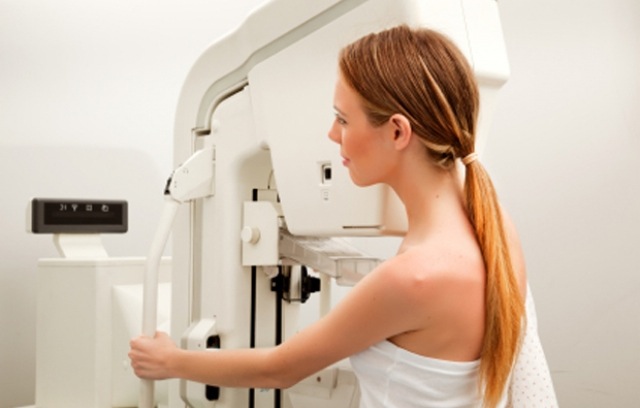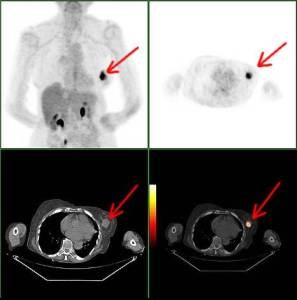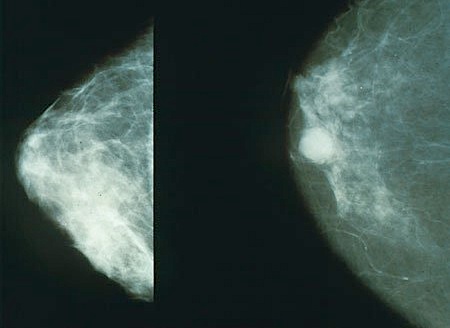Added by GM on January 13, 2013
Saved under Health, Jim Donahue
March 1, 2013

In his book, Iodine: Why you need it, why you can’t live without it, David Brownstein M.D. reports three cases of spontaneous regression of breast cancer after iodine supplementation.
The first patient, Joan a 63-year-old English teacher, was diagnosed with breast cancer in 1989, declined conventional treatment, and took 50 mg per day of Lugol’s Solution, (Iodine). Six weeks later, a PET scan (left image) showed, “all of the existing tumors were disintegrating.”

The second patient, 73-year-old Delores, was diagnosed with breast cancer in 2003. She declined conventional treatment with radiation and chemotherapy. Instead, Dolores took 50 mg of Lugol’s Solution daily. A follow-up ultrasound of the breast 18 months later showed,” It appears that these malignancies have diminished in size since the last examination. Interval improvement is definitely seen.” Two years later, a follow up mammogram and ultrasound failed to show any abnormality and were read by the radiologist as normal.
The third patient, 52-year-old Joyce, was diagnosed with breast cancer two years prior (left image), and started on Lugol’s Solution, 50 mg per day. Three years after starting Lugol’s Solution, her follow up mammograms and ultrasound exams show decreasing size of the tumor with no progression.
Iodine Deficiency Causes Breast Cancer – The Overwhelming Evidence
Human Studies of Areas with Low Iodine
Iodine deficiency is associated with a higher rate of goiter and breast cancer. Similarly, higher dietary Iodine intake is associated with less goiter and breast cancer. For example, Japan has the highest dietary intake of iodine (13 mg per day), and the lowest rates for goiter and breast cancer. However, when Japanese women immigrate and change dietary intake of Iodine to the lower 150 mcg/day in America, breast cancer rates increase.
Iceland is another country with high Iodine intake and low rates for goiter and breast cancer. The high dietary iodine came from the fishing industry before WWI. In those days, the fish meal was fed to dairy cows providing milk with high iodine content. After WWI, the fish meal was eliminated from the dairy cows, and breast cancer rates soared ten-fold.
 Animal studies
Animal studies
Iodine deficient diets in animals induce breast cancer and goiter.
Iodine Research from Mexico, India and Japan.
India
The Shrivastava group in India reported molecular iodine induces apoptosis (programmed cell death) in human breast cancer cell cultures. “Iodine showed cytotoxic effects in the cultured human breast cancer cells.”
Mexico
From Mexico, the Carmen Aceves Velasco Group reported Iodine to be safe, with no harmful effects on thyroid function, and an anti-proliferative effect on human breast cancer cell cultures. Their 2009 paper reported the mechanism by which Iodine works as an anti-cancer agent. Iodine binds to membrane lipids called lactones forming iodo-lactones which regulate apoptosis (programmed cell death). Iodine causes apoptosis which makes cancer cells undergo programmed cell death. Dr. Aceves concluded that continuous molecular iodine treatment has a “potent antineoplastic effect” on the progression of mammary cancer.
Japan
From Japan, Dr Funahashi reported a common seaweed food containing high iodine content is more beneficial than chemotherapy on breast cancer . “He found that administration of Lugol’s iodine or iodine-rich Wakame seaweed to rats treated with the carcinogen dimethyl benzanthracene suppressed the development of mammary tumors. The same group demonstrated that seaweed induced apoptosis in human breast cancer cells with greater potency than that of fluorouracil, a chemotherapeutic agent used to treat breast cancer.”
Mechanism of Action-Altering Gene Expression
A 2008 paper by Bernard A. Eskin MD showed that Iodine actually altered gene expression in breast cancer cells, inducing programmed cell death.
Lung Cancer and Iodine
A 2003 study by Ling Zhang showed that molecular Iodine caused lung cancer cells to undergo programmed cell death (apoptosis). These lung cancer cells had been genetically modified to increase iodine uptake. Interestingly, a 1993 case report describes spontaneous remission of lung cancer in a patient incidentally treated with Amiodorone which contains iodine (about 9 mg per day).
In Conclusion
Current Iodine research calls for use of molecular Iodine for all patients with breast cancer. Other cancers such as lung and prostate may also benefit. Further research on Iodine as cancer chemotherapy should receive top priority for NIH funding.






Leave a comment